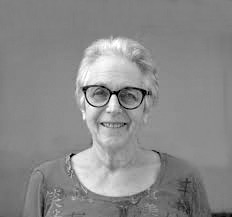 Anne, circa 1942.
Anne, circa 1942. As a child, whenever I asked my mother to tell me about her escape from the Nazis, she always had the same answer: “Let me tell you about my arrival in America.”
It was April 19, 1940, when the SS Nova Scotia, a freighter re-outfitted to carry passengers across the Atlantic, steamed into Boston Harbor after a 14-day passage from Liverpool, England. It carried several crates of Irish whiskey and 130 Jewish refugees from Germany and Austria. One of them was 12-year-old Anne Forchheimer, my mother.
She would describe that day in almost epic terms: “There were red, white and blue balloons — bundles of them — tied to the docks and some floating up into the sky. I had never seen balloons before. There was a band on the docks playing music. And there were United States flags waving everywhere I looked. And bunting. And streamers.”
What she didn’t know at the time was that April 19 was a holiday in Massachusetts, Paul Revere Day.
In Boston, Paul Revere has long been a local hero. His famous midnight horseback ride on April 18-19, 1775 — to alert the colonial militia of the approaching British forces — was critical to launching the American Revolution. The state made Paul Revere Day, also called Patriots’ Day, a holiday in 1896. It was observed on April 19 until the state legislature moved it in 1969 to the third Monday in April. The Boston Marathon is run on this day.
In 1940, my German-born mother had never heard of Paul Revere, since she hadn’t yet studied U.S. history. “I had no idea,” she always told us, “that the party was for anyone other than us.”
“I had no idea, that the party was for anyone other
than us.” — Anne Rubin (nee Forchheimer)
Aboard the ship, she and my grandmother, grandfather and uncle, along with the other passengers, waited on the deck for their turns to meet with immigration officers and marveled at the festive tumult around them.

My mother, Anne Rubin, would always conclude her story the same way: “I saw the flags, the streamers, the balloons, the band, all of it. I tugged on my mother’s sleeve and said to her, ‘What a wonderful country, Mother! Look how they welcome the refugees.’”
Most refugees have fond recollections of arriving in the United States, but I can’t imagine many experienced the awe, wonder and deep affection that inspired my mother that day. She remained a patriotic American from that moment until she died nearly seven decades later.
And every year on April 19 she would remind us how many years she had been in the United States, what a wonderful country it was and how lucky she was — and we were — to be here.
She knew she had done nothing special to merit an entrance visa. She simply was lucky to be born into a family with a relative in the U.S. willing and able to navigate the ever-increasing mountains of paperwork the government required before issuing entrance visas to Jewish refugees.
Although I had heard that story my entire life, it was only a couple of years ago, in the summer of 2016, that I had the chance to visit Boston. My husband and I wanted to get a small taste of what my mother experienced that day, so we took a boat tour of the harbor.
When I told the tour guide my story, she pointed out the now-empty pier where the immigration offices had been in 1940. At the time my mother arrived, the tour guide explained, Boston had been the nation’s second-busiest point of entry for European immigrants. (I learned from my family-history research that at least one other ship carrying immigrants docked in Boston Harbor on the same day.)
“If this is where the ship docked,” I asked the tour guide, “then where was the party?”
“Everywhere!” she answered. “A new arrival to Boston on April 19 could not have missed the party. It was just too big.”
I love the vision of America that my mother saw that day in 1940, an America that celebrated its history and also welcomed refugees with streamers and balloons and flags and music, an America filled with welcome and hope and promise.
That is the America I want to live in.
Rachel Rubin-Green is a writer, mother, grandmother and retired teacher living in Los Angeles. She writes about her mother’s experiences at moreluckthanbrains.com.























 More news and opinions than at a Shabbat dinner, right in your inbox.
More news and opinions than at a Shabbat dinner, right in your inbox.